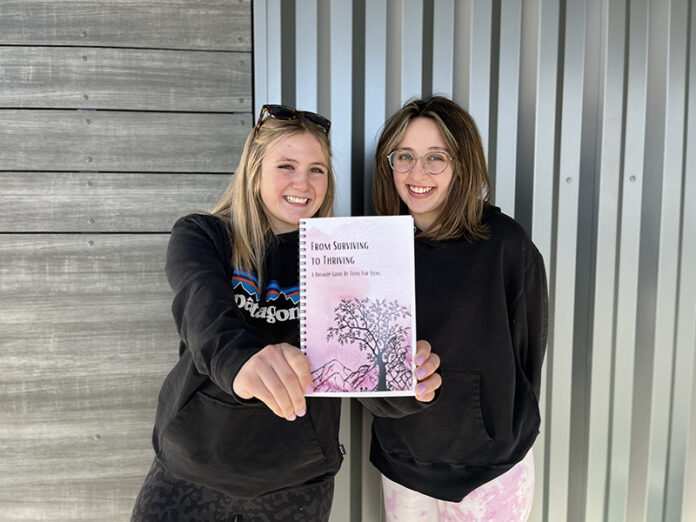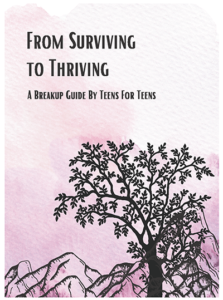
Teen interns advocate against teen dating violence with book launch
By Eric Valentine
“Although thou loved her as thyself, as a self of purer clay,
Although her parting dims the day stealing grace from all alive,
Heartily know, when the half-gods go, the gods arrive.”
 You can read that stanza from Ralph Waldo Emerson’s poem “Give All To Love” to The Advocates’ 16-year-old teen intern Asia Angel and two scenarios are likely to happen. First, she’d empathize with the poet’s sincere experience of true love; and second, she’d probably suggest Emerson reconsider that title and name it something that sounds a little less zero-sum-game.
You can read that stanza from Ralph Waldo Emerson’s poem “Give All To Love” to The Advocates’ 16-year-old teen intern Asia Angel and two scenarios are likely to happen. First, she’d empathize with the poet’s sincere experience of true love; and second, she’d probably suggest Emerson reconsider that title and name it something that sounds a little less zero-sum-game.
Angel and nine of her Every Teen Counts (ETC) cohorts have been dedicating much of their internship efforts to writing, curating and editing a book meant to soften the blow of breakups and help curb teen dating violence. So, starting April 2, there will be a third scenario, too. The Sage School high school student would advise you to attend The Advocates book launch event that evening from 5 to 6 p.m. at 211 S. River Street in Hailey and receive (or order) “From Surviving to Thriving—A breakup guide by teens for teens.”
Specifically, the book comprises four sections named after the seasons of the year and metaphor for the cyclical process of growth and death and rebirth found in nature.
“It’s helpful to see a relationship as cyclical, too,” said Angel. “If we think of it as linear, then the end is a negative thing.”
The ETCs are a group of paid teen interns from across the Wood River Valley. They are healthy-relationship peer educators and influencers for teens. They inspire cultural change through peer-education, awareness campaigns, and healthy relationship events. And the work couldn’t be more critical if recent data from Eastern Idaho Public Health is any indication:
- 1 in 3 teens in a dating relationship have been verbally, emotionally, sexually or physically abused
- 1 in 2 teens have compromised their values to please their partner
- 1 in 5 teens in a dating relationship have been hit, slapped, or pushed
“Teen dating violence is actually more prevalent than adult dating violence” when you consider that one form of violence is the emotional, verbal abuse that can proliferate over the internet and social media, where teens can either thrive or survive or something worse, explained Monica Reyna, a Violence Prevention Coordinator for The Advocates.
The Every Teen Counts paid internship program is in its ninth year. Each year the cohort of teens announce their campaign for Teen Dating Violence Awareness Month. “From Surviving to Thriving” is that campaign this year, and it attempts to reframe the way we look at breakups and rejection in relationships. Through education and storytelling, the interns are hoping to reduce the stigma around breaking up, the fear of being single, and the guilt of putting ourselves sometimes first.
For Angel, who is originally from a small town in Washington State where, she said, bad breakups were accepted as normal, the prevalence of bad breakups doesn’t have to be so high if couples breaking up can focus on the “end of that process.”
“In most cases, the communication turns negative right at the very end. So it just makes sense if we have some different perspectives and (de-escalation) skills before we start a relationship, we’re going to see less traumatic events at the end of the relationship,” Angel said.
The thought process behind the book that will be distributed around the Valley and potentially at schools assumes some basic tenants:
- Breakups occur across the relationship spectrum: healthy, unhealthy, and abusive. Some people break up because they are going in different directions, some because their relationship isn’t healthy.
- Learning healthy skills around breaking up is more than helpful, it can be life saving.
- Breakups can feel like the end of the world if messages in the media and society tell us that we should eat ice cream, indulge in unhealthy habits, or rebound in order to “get over it.”
- After a breakup or rejection, we might be tempted (or even encouraged) to act in ways that are hurtful to ourselves and to others.
- Rarely do we discuss how to create equality, safety, and respect during breakups and rejection.
- Rarely do we discuss the benefits to breaking up, such as learning independence, focusing on self-care and self-worth, or deepening our relationships.
“Ultimately, if we reduce the stigma around breaking up and encourage healthy relationship skills, we can create the healthy relationships with ourselves and others that we deserve,” said intern Charlotte Stone.
Healthy relationship skills for rejection and breaking up include:
- Healthy communication skills
- How to break up respectfully
- How to have “hard” conversations
- How to be vulnerable and mature
- How to deal with the hurts of breaking up
Here is the link to the virtual version of the guide: bit.ly/ETCguide
The Advocates Every Teen Counts Interns are:
- Asia Angel
- Cassius Klingenfuss
- Cesar Tellez
- Charlotte Stone
- Finn Rust
- Jasmine Santacruz
- Joseph Melgar-Egoavil
- Leam Van Law
- Maeve Coffelt
- Reece Walther-Porino
